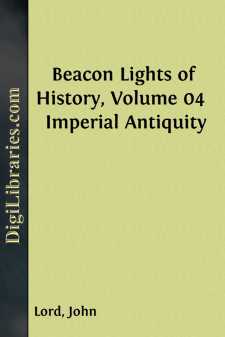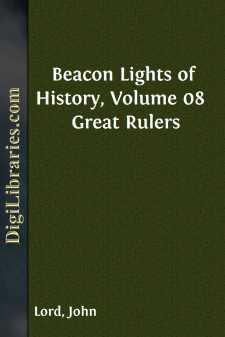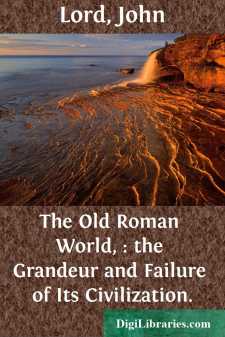Categories
- Antiques & Collectibles 13
- Architecture 36
- Art 48
- Bibles 22
- Biography & Autobiography 813
- Body, Mind & Spirit 142
- Business & Economics 28
- Children's Books 14
- Children's Fiction 11
- Computers 4
- Cooking 94
- Crafts & Hobbies 4
- Drama 346
- Education 46
- Family & Relationships 57
- Fiction 11829
- Games 19
- Gardening 17
- Health & Fitness 34
- History 1377
- House & Home 1
- Humor 147
- Juvenile Fiction 1873
- Juvenile Nonfiction 202
- Language Arts & Disciplines 88
- Law 16
- Literary Collections 686
- Literary Criticism 179
- Mathematics 13
- Medical 41
- Music 40
- Nature 179
- Non-Classifiable 1768
- Performing Arts 7
- Periodicals 1453
- Philosophy 64
- Photography 2
- Poetry 896
- Political Science 203
- Psychology 42
- Reference 154
- Religion 513
- Science 126
- Self-Help 84
- Social Science 81
- Sports & Recreation 34
- Study Aids 3
- Technology & Engineering 59
- Transportation 23
- Travel 463
- True Crime 29
Beacon Lights of History, Volume 09 European Statesmen
by: John Lord
Description:
Excerpt
CHATEAUBRIAND.
1768-1848.
THE RESTORATION AND FALL OF THE BOURBONS.
In this lecture I wish to treat of the restoration of the Bourbons, and of the counter-revolution in France.
On the fall of Napoleon, the Prussian king and the Austrian emperor, under the predominating influence of Metternich, in restoring the Bourbons were averse to constitutional checks. They wanted nothing less than absolute monarchy, such as existed before the Revolution. On the other hand, the Czar Alexander, generous and inclined then to liberal ideas, was willing to concede something to the Revolution; while the government of England, mindful of the liberty which had made that country so glorious and so prosperous, also favored a constitutional government in the person of the legitimate heir of the French monarchy. Such was also the wish of the French nation, so far as it could be expressed; for the French people, under whatever form of government they may have lived, have never forgotten or repudiated the ideas and bequests of the greatest movement in modern times.
Prussia and Austria, therefore, were obliged to yield to Russia and England, supported by the will of the French nation itself. Russia had no jealousy of French ideas; and England certainly could not, consistently with her struggles and her traditions, oppose what the English nation resolutely clung to, and of which it was so proud. Prussia and Austria, undisturbed by revolutions, wished simply the restoration of the status quo, which with them meant absolute monarchy; but which in France was not really the status quo, since the Revolution had effected great and permanent changes even under the régime of Bonaparte. Russia and England, in conceding something to liberty, were yet as earnest and sincere advocates of legitimacy as Prussia and Austria; for constitutional rights may exist under a monarchy as well as under a republic. Moreover, it was felt by enlightened statesmen of all parties that no government could be stable and permanent in France which ignored the bequests of the Revolution, which even Napoleon professed to respect.
Accordingly it was settled that Louis XVIII.,--the younger brother of Louis XVI., who had fled from France in 1792,--should be recalled from exile, and restored to the throne of his ancestors, since he agreed to accept checks to his authority, and swore to defend the new constitution, although he insisted upon reigning "by the grace of God,"--not as a monarch who received his crown from the people, or as a gift from other monarchs, but by divine right. To this all parties consented. He maintained the dignity of the royal prerogative at the same time that he recognized the essential liberties of the nation. They were not so full and complete as those in England; but the king guaranteed to secure the rights both of public and private property, to respect the freedom of the Press, to grant liberty of worship, to maintain the national obligations, to make the judicial power independent and irremovable, and to admit all Frenchmen to civil and military employment, without restrictions in matters of religion. These in substance constituted the charter which he granted on condition of reigning,--an immense gain to France and the cause of civilization, if honestly maintained.
Louis XVIII. was neither a great king nor a great man; but his long exile of twenty years, his travels and residences in various countries in Europe, his misfortunes and his studies, had liberalized his mind without embittering his heart. He never lost his dignity or his hopes in his sad reverses; and when he was thus recalled to France to mount the throne of his murdered brother, he was a very respectable man, both from natural intelligence and extensive attainments. He possessed great social and conversational powers, was moderate in his views of Catholicism, virtuous in his private character, affectionate with his friends and the members of his family, prudent in the exercise of power, and disposed to reign according to the constitution which he honestly had accepted; but socially he restored the ancient order of things, surrounded himself with a splendid court, lived in great pomp and ceremony, and appointed the ancient nobles to the higher offices of state. According to French writers, he was the equal in conversation of any of the great men with whom he was brought in contact, without being great himself, thereby resembling Louis XIV. He had handsome features, a musical voice, pleasing manners, and singular urbanity, without being condescending. He was infirm in his legs, which prevented him from taking exercise, except in his long daily drives, drawn in his magnificent carriage by eight horses, with outriders and guards.
The king delegated his powers to no single statesman, but held the reins in his own hand. His ability as a ruler consisted in his tact and moderation in managing the conflicting parties, and in his honest abstention from encroaching on the liberties of the people in rare emergencies; so that his reign was peaceable and tolerably successful. It required no inconsiderable ability to preserve the throne to his successor amid such a war of factions, and such a disposition for encroachments on the part of the royal family. In contrast with the splendid achievements and immense personality of Napoleon, Louis XVIII. is not a great figure in history; but had there been no Revolution and no Napoleon, he would have left the fame of a wise and benevolent sovereign. His only striking weakness was in submitting to the influence of either a favorite or a woman, like all the Bourbons from Henry IV. downward,--except perhaps Louis XVI., who would have been more fortunate had he yielded implicitly to the overpowering ascendency of such a woman as Madame de Maintenon, or such a minister as Richelieu.
The reign of Louis XVIII. is not marked by great events or great passions, except the unrelenting and bitter animosity of the Royalists to everything which characterized the Revolution or the military ascendency of Napoleon. By their incessant intrigues and unbounded hatreds and intolerant bigotry, they kept the kingdom in constant turmoils, even to the verge of revolution, gradually pushing the king into impolitic measures, against his will and his better judgment, and creating a reaction to all liberal movements. These turmoils, which are uninteresting to us, formed no inconsiderable part of the history of the times. The only great event of the reign was the war in Spain to suppress revolutionary ideas in that miserable country, ground down by priests and royal despotism, and a prey to every conceivable faction.
The ministry which the king appointed on his accession was composed of able, moderate, and honest men, but without any ascendant genius, except Talleyrand; who selected his colleagues, and retained for himself the portfolio of foreign affairs and the presidency of the Council, giving to Fouché the management of internal affairs. Loth was the king to accept the services of either,--the one a regicide, and the other a traitor. The whole royal family set up a howl of indignation at the appointment of Fouché; but it was deemed necessary to secure his services in order to maintain law and order, and the king remained firm against the earnest expostulations of his brother the Comte d'Artois, his niece the Duchesse d'Angoulême, and all the Royalists who had influence with him. But he despised and hated in his soul Fouché,--that minion of Napoleon, that product of blood and treason,--and waited only for a convenient time to banish him from the councils and the realm. Nor did he like Talleyrand (at that time the greatest man in France), but made use of his magnificent talents only until he could do without him. When the king felt established on his throne, he sent Talleyrand away; indeed, there was great pressure brought to bear for the dismissal by those who found the minister too moderate in his views. The king did not punish him, but kept him in a subordinate office, leaving him to enjoy his dignities and the immense fortune he had accumulated.
Talleyrand was born in 1754, and belonged to one of the most illustrious families in France. He was destined to the Church against his will, being from the start worldly, ambitious, and scandalously immoral; but he accepted his destiny, and soon distinguished himself at the Sorbonne for his literary attainments, for his wit and his social qualities. At twenty, as the young Abbé de Périgord, he was received into the highest society of Paris; his noble birth, his aristocratic and courtly manners, his convivial qualities, and his irrepressible wit made him a favorite in the gay circles which marked the early part of the reign of Louis XVI., while his extraordinary abilities and consummate tact naturally secured early promotion. In 1780 he was appointed to the office of general agent for the clergy of France, which brought him before the public. Eight years after, at the early age of thirty-four, he was made Bishop of Autun. In May, 1789, he became a member of the States-General, and with his fascinating eloquence tried to induce the clergy to surrender their tithes and church lands to the nation,--a result which was brought about soon after, nolens volens, by the genius of Mirabeau. Talleyrand hated the Church and despised the people, but, like Mirabeau, was in favor of a constitution like that of England, In all his changes he remained an aristocrat from his tastes, his education, and his rank, but veiled his views, whatever they were, with profound dissimulation, of which he was a consummate master. The laxity of his morals, the secret hatred of his order, and his infidel sentiments led to his excommunication, which troubled him but little. Out of the pale of the Church, he turned his thoughts to diplomacy, and was sent to London as an ambassador,--without, however, the official title and insignia of that high office,--where he fascinated the highest circles by the splendor of his conversation and the causticity of his wit. On his return to Paris he was distrusted by the Jacobins, and with difficulty made his escape to England; but the English government also distrusted a man of such boundless intrigue, and ordered him to quit the country within twenty-four hours. He fled to America at the age of forty, with straitened means, but after the close of the Reign of Terror returned to Paris, and six months later was made foreign minister under the Directory. This office he did not long retain, failing to secure the confidence of the government. The austere Carnot said of him:--
"That man brings with him all the vices of the old régime, without being able to acquire a single virtue of the new one. He possesses no fixed principles, but changes them as he does his linen, adopting them according to the fashion of the day. He was a philosopher when philosophy was in vogue; a republican now, because it is necessary at present to be so in order to become anything; to-morrow he would proclaim and uphold tyranny, if he could thereby serve his own interests. I will not have him at any price; and so long as I am at the helm of State he shall be nothing."
When Bonaparte returned from Egypt, Citizen Talleyrand had been six months out of office, and he saw that it would be for his interest to put himself in intimate connection with the most powerful man in France. Besides, as a diplomatist, he saw that only in a monarchical government could he have employment. Napoleon, who seldom made a mistake in his estimate of character, perceived that Talleyrand was just the man for his purpose,--talented, dexterous, unscrupulous, and sagacious,--and made him his minister of foreign affairs, utterly indifferent as to his private character. Nor could he politically have made a wiser choice; for it was Talleyrand who made the Concordat with the Pope, the Treaty of Luneville, and the Peace of Amiens. Napoleon wanted a practical man in the diplomatic post,--neither a pedant nor an idealist; and that was just what Talleyrand was,--a man to meet emergencies, a man to build up a throne. But even Napoleon got tired of him at last, and Talleyrand retired with the dignity of vice-grand elector of the empire, grand chamberlain, and Prince of Benevento, together with a fortune, it is said, of thirty million francs.
"How did you acquire your riches?" blandly asked the Emperor one day. "In the simplest way in the world," replied the ex-minister. "I bought stock the day before the 18th Brumaire [when Napoleon overthrew the Directory], and sold it again the day after."
When Napoleon meditated the conquest of Spain, Talleyrand, like Metternich, saw that it would be a blunder, and frankly told the Emperor his opinion,--a thing greatly to his credit. But his advice enraged Napoleon, who could brook no opposition or dissent, and he was turned out of his office as chamberlain. Talleyrand avenged himself by plotting against his sovereign, foreseeing his fall, and by betraying him to the Bourbons. He gave his support to Louis XVIII., because he saw that the only government then possible for France was one combining legitimacy with constitutional checks; for Talleyrand, with all his changes and treasons, liked neither an unfettered despotism nor democratic rule. As one of those who acted with the revolutionists, he was liberal in his ideas; but as the servant of royalty he wished to see a firmly established government, which to his mind was impossible with the reign of demagogues. When the Congress of Vienna assembled, he was sent to it as the French plenipotentiary. And he did good work at the Congress for his sovereign, whose representative he was, and for his country by contriving with his adroit manipulations to alienate the northern from the southern States of Germany, making the latter allies of France and the former allies of Russia,--in other words, practically dividing Germany, which it was the work of Bismarck afterward to unite. A united Germany Talleyrand regarded as threatening to the interests of France; and he contrived to bring France back again into political importance,-- to restore her rank among the great Powers. He did not bargain for spoils, like the other plenipotentiaries; he only strove to preserve the nationality of France, and to secure her ancient limits, which Prussia in her greed and hatred would have destroyed or impaired but for the magnanimity of the Czar Alexander and the firmness of Lord Castlereagh.
On his return from the Congress of Vienna, the reign of Talleyrand as prime minister was short; and as his power was comparatively small under both Louis XVIII. and his successor Charles X., and as he was not the representative of reactionary ideas or movements, but only of a firm government, I do not give to him the leadership of the counter-revolution. He was unquestionably the greatest statesman at that time in France, though indolent, careless, and without power as an orator.
Who was then the great exponent of reaction, and of antagonism to liberal and progressive opinions, during the reigns of the restored Bourbons? It was not the king himself, Louis XVIII.; for he did all he could to repress the fanatical zeal of his family and of the royalist party. He despised the feeble mind of his brother, the Comte d'Artois, his narrow intolerance, and his court of priests and bigots, and was in perpetual conflict with him as a politician, while at the same time he clung to him with the ties of natural affection.
Was it the Duc de Richelieu, grand-nephew of the great cardinal, whom the king selected for his prime minister on the retirement of Talleyrand? He hardly represents the return to absolutism, since he was moderate, conciliatory, and disposed to unite all parties under a constitutional government. No man in France was more respected than he,--adored by his family, modest, virtuous, disinterested, and patriotic. As an administrator in the service of Russia during the ascendency of Napoleon, he had greatly distinguished himself. He was a favorite of Alexander, and through his influence with the Czar France was in no slight degree indebted for the favorable terms which she received on the restoration of the monarchy, when Prussia exacted a cruel indemnity. He wished to unite all parties in loyal submission to the constitution, rather than secure the ascendency of any. While able and highly respected, Richelieu was not pre-eminently great. Nor was Villèle, who succeeded him as prime minister, and who retained his power for six or eight years, nearly to the close of the reign of Charles X., a great historical figure.
The man under the restored monarchy who represented with the most ability reactionary movements of all kinds, and devotion to the cause of absolute monarchy, I think was Francois Auguste, Vicomte de Chateaubriand. Certainly he was the most illustrious character of that period. Poet, orator, diplomatist, minister, he was a man of genius, who stands out as a great figure in history; not so great as Talleyrand in the single department of diplomacy, but an infinitely more respectable and many-sided man. He had an immense éclat in the early part of this century as writer and poet, although his literary fame has now greatly declined. Lamartine, in his sentimental and rhetorical exaggeration, speaks of him as "the Ossian of France,--an aeolian harp, producing sounds which ravish the ear and agitate the heart, but which the mind cannot define; the poet of instincts rather than of ideas, who gained an immortal empire, not over the reason but over the imagination of the age."
Chateaubriand was born in Brittany, of a noble but not illustrious family, in 1769, entered the army in 1786, and during the Reign of Terror emigrated to America. He returned to France in 1799, after the 18th Brumaire, and became a contributor to the "Mercure de France." In 1802 he published the "Génie du Christianisme," which made him enthusiastically admired as a literary man,--the only man of the time who could compete with the fame of Madame de Staël. This book astonished a country that had been led astray by an infidel philosophy, and converted it back to Christianity, not by force of arguments, but by an appeal to the heart and the imagination. The clergy, the aristocracy, women, and youth were alike enchanted. The author was sent to Rome by Napoleon as secretary of his embassy; but on the murder of the Due d'Enghien (1804), Chateaubriand left the imperial service, and lived in retirement, travelling to the Holy Land and throughout the Orient and Southern Europe, and writing his books of travels. He took no interest in political affairs until the time of the Restoration, when he again appeared. A brilliant and effective pamphlet, "De Bonaparte et des Bourbons," published by him in 1814, was said by Louis XVIII. to be worth an army of a hundred thousand men to the cause of the Bourbons; and upon their re-establishment Chateaubriand was immediately in high favor, and was made a member of the Chamber of Peers.
The Chamber of Peers was substituted for the Senate of Napoleon, and was elected by the king. It had cognizance of the crime of high treason, and of all attempts against the safety of the State. It was composed of the most distinguished nobles, the bishops, and marshals of France, presided over by the chancellor. To this chamber the ministers were admitted, as well as to the Chamber of Deputies, the members of which were elected by about one hundred thousand voters out of thirty millions of people. They were all men of property, and as aristocratic as the peers themselves. They began their sessions by granting prodigal compe












